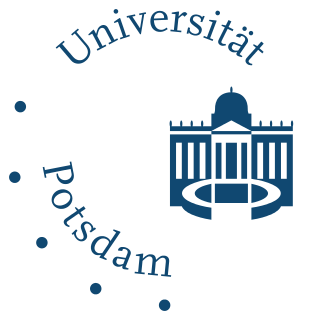Organisation
The Otto Stern School was founded in 2006 as a scientific centre of the Goethe University. It offers support and sponsorship for its members. Doctoral candidates and their supervising teams (professors and, as second or third supervisor, postdocs) can become members if they belong to one of the natural sciences faculties or PhD programmes and Collaborate Research Centres of the Goethe University, e.g.: International Helmholtz Graduate School
- Frankfurt International School of Science (FIGSS)
- DFG Priority Programme Genom organisation and Genom expression in Archaea
- Collaborative Research Center Functional Membrane Proteomics
- International Max Planck Research School for Structure and Function of Biological Membrane
- Research Training Group Neuronal Plasticity
- Research unit RIFT Dynamics
- Research unit Spin and Charge correlations in low-dimensional metallorganic solid state
- Research unit Ecological and Cultural Change in West and Central Africa
Institutions of the Otto Stern School are the Council, consisting of representatives of the respective faculties, PhD programmes, supervisors and doctoral candidates, the Directorate, the Quality-Assurance Board, the Admission Committees, the Chairperson, the Management and the Ombudsperson.

Located in the campus of Science and Technology of the University of Lille in Villeneuve-d'Ascq ; École Centrale de Lille is a renowned graduate engineering school, with roots back to 1854 as the École des arts industriels et des mines de Lille, re-organised in 1872 as Institut industriel du Nord. It is one of the Centrale Graduate Schools.
Postgraduate education involves learning and studying for academic or professional degrees, academic or professional certificates, academic or professional diplomas, or other qualifications for which a first or bachelor's degree generally is required, and it is normally considered to be part of higher education. In North America, this level is typically referred to as graduate school.

A doctorate or doctor's degree or doctoral degree, is an academic degree awarded by universities, derived from the ancient formalism licentia docendi. In most countries, it is a research degree that qualifies the holder to teach at university level in the degree's field, or to work in a specific profession. There are a number of doctoral degrees; the most common is the Doctor of Philosophy (PhD), which is awarded in many different fields, ranging from the humanities to scientific disciplines.

A thesis or dissertation is a document submitted in support of candidature for an academic degree or professional qualification presenting the author's research and findings. In some contexts, the word "thesis" or a cognate is used for part of a bachelor's or master's course, while "dissertation" is normally applied to a doctorate, while in other contexts, the reverse is true. The term graduate thesis is sometimes used to refer to both master's theses and doctoral dissertations.

A graduate school is a school that awards advanced academic degrees with the general requirement that students must have earned a previous undergraduate (bachelor's) degree. A distinction is typically made between graduate schools and professional schools, which offer specialized advanced degrees in professional fields such as medicine, nursing, business, engineering, speech-language pathology, or law. The distinction between graduate schools and professional schools is not absolute since various professional schools offer graduate degrees and vice versa.
Habilitation is a qualification required in order to conduct self-contained university teaching, and to obtain a professorship in many European countries. Despite changes implemented in European higher-education systems consequent to the Bologna Process, habilitation is the highest qualification issued through the process of a university examination, and remains a core concept of scholarly careers in these countries.
The Doctor of Education is both a research and professional doctoral degree that focuses on the field of education. As the highest degree in the field, it prepares the holder for academic, research, administrative, clinical, or professional positions in educational, civil, private organizations, or public institutions.
A Master of Laws is an advanced, postgraduate academic degree, pursued by those either holding an undergraduate academic law degree, a professional law degree, or an undergraduate degree in a related subject. In some jurisdictions, the "Master of Laws" is the basic professional degree for admission into legal practice.

Goethe University is a university located in Frankfurt am Main, Germany. It was founded in 1914 as a citizens' university, which means it was founded and funded by the wealthy and active liberal citizenry of Frankfurt. The original name was Universität Frankfurt am Main. In 1932, the university's name was extended in honour of one of the most famous native sons of Frankfurt, the poet, philosopher and writer/dramatist Johann Wolfgang von Goethe. The university currently has around 45,000 students, distributed across four major campuses within the city.

Heinrich Heine University Düsseldorf (HHU) was founded in 1965 as the successor organisation to Düsseldorf’s Medical Academy of 1907. Following several expansions throughout the decades, the university has comprised five faculties since 1993. At present, more than 20,000 full-time students are pursuing studies at HHU. There is a total staff of approximately 2,900 persons at HHU.
The Master of Philosophy is a postgraduate degree. An MPhil typically includes a taught portion and a significant research portion, during which a thesis project is conducted under supervision. An MPhil may be awarded to postgraduate students after completing taught coursework and one to two years of original research, which may also serve as a provisional enrollment for a PhD programme.
A Master of Research degree is an internationally recognised advanced postgraduate research degree. In most cases, the degree is designed to prepare students for doctoral research. Increasingly, the degree may be useful for students considering careers outside of academia, where high-level research skills are valued but a doctoral qualification is not required.

The University of Potsdam is a public university in Potsdam, capital of the state of Brandenburg, Germany. It is mainly situated across three campuses in the city. Some faculty buildings are part of the New Palace of Sanssouci which is known for its UNESCO World Heritage status.

The Hertie School is a German private independent graduate school located in Berlin's Friedrichstraße. It has a right to confer doctoral degrees. Half of the students in the Hertie School come from abroad, and the working language is English.

A Doctor of Philosophy is the highest university degree that is conferred after a course of study by universities in most countries. PhDs are awarded for programs across the whole breadth of academic fields. Because it is an earned research degree, those studying for a PhD are usually required to produce original research that expands the boundaries of knowledge, normally in the form of a thesis or dissertation, and defend their work against experts in the field. The completion of a PhD is often a requirement for employment as a university professor, researcher, or scientist in many fields. Individuals who have earned a Doctor of Philosophy degree may, in many jurisdictions, use the title Doctor with their name, although the proper etiquette associated with this usage may also be subject to the professional ethics of their own scholarly field, culture, or society. Those who teach at universities or work in academic, educational, or research fields are usually addressed by this title "professionally and socially in a salutation or conversation." Alternatively, holders may use post-nominal letters such as "Ph.D.", "PhD", or "DPhil". It is, however, considered incorrect to use both the title and post-nominals at the same time.
The International Graduate School in Molecular Medicine Ulm (IGradU) of Ulm University has been established in 2006 and is supported by the Excellence Initiative of the German Federal and State Governments since 2007. It promotes and supports graduate education and training in the field of biomedical research. There are two structured training programs on offer: The International PhD Programme in Molecular Medicine Ulm for doctoral candidates in the natural sciences and the program Experimental Medicine for doctoral candidates in medicine.

Doctor of Law or Doctor of Laws is a degree in law. The application of the term varies from country to country and includes degrees such as the Doctor of Juridical Science, Doctor of Philosophy (Ph.D.), Juris Doctor (J.D.), and Legum Doctor (LL.D.).
In the United States, the PhD degree is the highest academic degree awarded by universities in most fields of study. American students typically undergo a series of three phases in the course of their work toward the PhD degree. The first phase consists of coursework in the student's field of study and requires one to three years to complete. This often is followed by a preliminary, a comprehensive examination, or a series of cumulative examinations where the emphasis is on breadth rather than depth of knowledge. The student is often later required to pass oral and written examinations in the field of specialization within the discipline, and here, depth is emphasized. After the comprehensive examination the student is a "PhD Candidate", which is the academic equivalent of a master's degree. Some universities will award terminal Master's for students who drop out of the PhD program at this stage, and some, like Columbia University and the Albert Einstein College of Medicine, award a Master's en route to the PhD. Some PhD programs require the candidate to successfully complete requirements in pedagogy or applied science.
Wolfgang Franz was a German mathematician who specialized in topology particularly in 3-manifolds, which he generalized to higher dimensions. He is known for the Reidemeister–Franz torsion. He also made important contributions to the theory of lens spaces.










